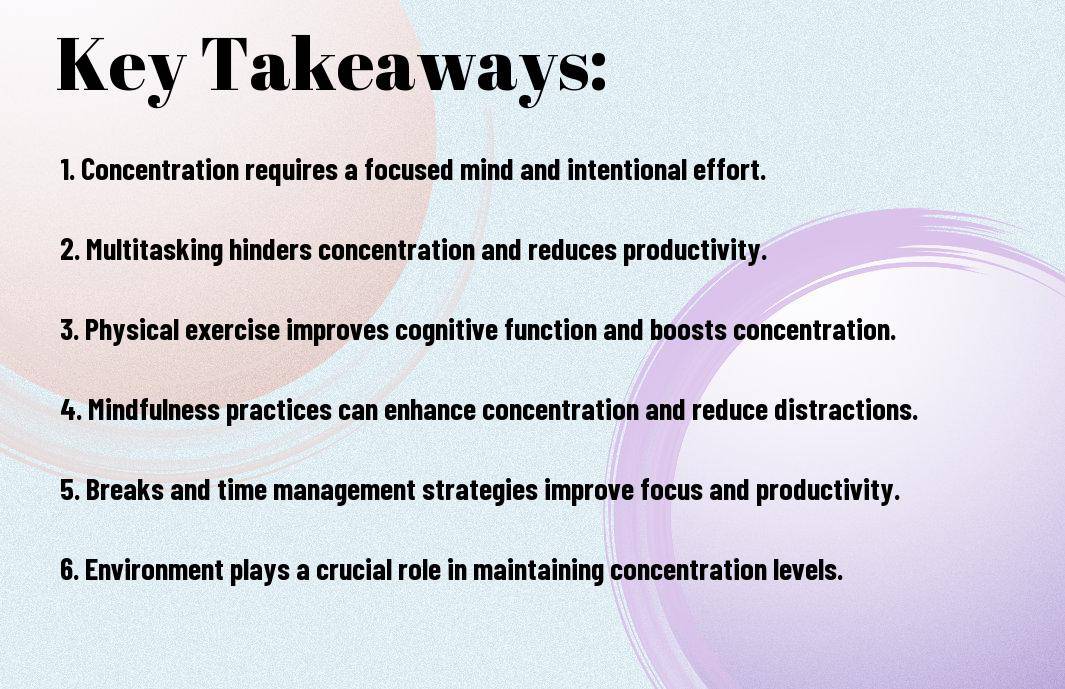
Newsletter Subscribe
Enter your email address below and subscribe to our newsletter

Enter your email address below and subscribe to our newsletter

There’s a fascinating connection between concentration and focus that many may overlook. Understanding the science behind how our brains concentrate can greatly enhance our ability to focus on tasks and achieve our goals efficiently. Dive into the complexities of the mind with us as we explore how concentration plays a crucial role in mastering the art of focus.


Some people underestimate the power of focus in today’s fast-paced world. In a society filled with distractions, mastering the art of concentration is important for achieving success in various aspects of life. Let’s explore into the science behind focus and how it influences our daily performance and overall well-being.
Focus is the ability to direct our attention and energy towards a specific task or goal. It involves excluding distractions and staying engaged in the present moment. Concentration, on the other hand, is the mental effort we put into maintaining focus over a period of time. Together, they form the foundation of productivity and efficiency in our lives.
Understanding the relationship between the brain and focus is crucial for improving our ability to concentrate. When we focus on a task, the prefrontal cortex – the part of the brain responsible for decision-making and problem-solving – becomes activated. This region helps us filter out irrelevant information and concentrate on what’s important.
To enhance our focus, it’s important to engage in activities that promote neuroplasticity, the brain’s ability to reorganize itself by forming new neural connections. Through practices such as meditation, mindfulness, and cognitive exercises, we can strengthen our neural pathways associated with sustained attention and concentration.
Now, let’s probe into the fascinating world of concentration and the science behind it. Understanding how our brains function when we focus on a particular task can shed light on how we can improve our concentration levels.
The brain uses a complex network of neurotransmitters, including dopamine, norepinephrine, and acetylcholine, to regulate concentration. These chemicals play a crucial role in signaling between neurons and are responsible for keeping us focused and alert. Dopamine, in particular, is known for its role in motivation and reward, driving us to stay on task and complete goals. Norepinephrine helps us maintain attention during challenging or demanding tasks, while acetylcholine is necessary for learning and memory, aiding in information retention.
Distractions pose a significant challenge to our brain’s ability to concentrate effectively. When we are bombarded with distractions, our brain’s prefrontal cortex, responsible for decision-making and focus, can become overwhelmed. Constant interruptions can lead to a decrease in productivity and cognitive performance, making it harder to concentrate on the task at hand.
Role: It is necessary to recognize the detrimental effects distractions can have on our ability to concentrate. By minimizing distractions and creating a conducive environment for focus, we can optimize our brain’s concentration abilities and improve overall productivity.
Keep your mind focused and improve concentration with the practice of mindfulness meditation. This technique involves paying attention to the present moment without judgment. By training your mind to be present and aware, you can enhance your ability to concentrate on tasks at hand. Mindfulness meditation has been shown to reduce stress, increase self-awareness, and improve cognitive function.
Improve your focus by incorporating effective time management strategies into your daily routine. Prioritize tasks based on importance and urgency, create a schedule or to-do list, and eliminate distractions. By organizing your time efficiently, you can optimize your productivity and enhance your concentration. Setting clear goals and deadlines can help you stay on track and maintain focus on your priorities.
Another imperative time management strategy for enhanced focus is the Pomodoro Technique. This method involves working in focused intervals, typically 25 minutes of work followed by a 5-minute break. By breaking work into manageable chunks and allowing for regular breaks, you can prevent burnout and maintain a high level of concentration throughout the day.
All too often, we find ourselves glued to our screens, battling the constant bombardment of notifications, emails, and social media updates. Distractions are everywhere, making it challenging to maintain our focus and concentration on the task at hand. It’s important to recognize the impact of these digital distractions on our ability to concentrate effectively.
An abundance of apps and tools are now available to help us combat digital distractions and enhance our concentration levels. From meditation apps to time management tools, there is a vast array of resources designed to support our focus in the digital age. These apps and tools offer features like focus timers, website blockers, and ambient noise generators to create an optimal environment for deep work.
Distractions apps and tools play a crucial role in helping individuals navigate the challenges of staying focused amidst a sea of digital interruptions. By leveraging these technologies, we can take control of our attention and cultivate a more productive and focused mindset.
After discussing the impact of lifestyle on focus, it’s imperative to explore how our daily choices can influence our ability to concentrate. From diet and nutrition to sleep and exercise, every aspect of our lifestyle plays a crucial role in enhancing or detracting from our focus.
Effects of diet and nutrition on focus cannot be overstated. Consuming a diet rich in whole foods, such as fruits, vegetables, whole grains, and lean proteins, can provide the necessary nutrients to support brain function and enhance focus. On the other hand, diets high in processed foods, sugar, and unhealthy fats can lead to cognitive decline and difficulty concentrating. It’s imperative to fuel our bodies and brains with nutrient-dense foods to optimize focus and concentration.
One of the most impactful ways to improve focus is by prioritizing sleep and exercise. Quality sleep is imperative for cognitive function, memory consolidation, and overall alertness. Regular exercise not only promotes better sleep but also increases levels of neurotransmitters that support focus and attention. Establishing a consistent sleep schedule and incorporating physical activity into your daily routine can have a profound effect on your ability to focus and concentrate.
Nutrition: Be mindful of, what you eat directly affects your focus and concentration. Make sure to include brain-boosting foods in your diet and avoid processed foods that can harm your cognitive function. Additionally, getting enough sleep and exercise plays a vital role in maintaining optimal focus levels. By making simple lifestyle changes, you can set yourself up for success in cultivating a focused and attentive mind.
Despite the myriad distractions in our modern world, developing strong focus and concentration skills is crucial for success in any field. In this chapter, we will explore practical applications of the science of concentration to enhance productivity and achieve goals effectively.
One of the key techniques for improving concentration is the Pomodoro Technique, which involves working in focused 25-minute intervals with short breaks in between. Additionally, techniques such as mindfulness meditation and deep breathing exercises can help calm the mind and enhance focus. By incorporating these techniques into daily study routines, students can improve their learning retention and academic performance.
On a professional level, staying focused amidst numerous tasks and distractions can be challenging. One effective strategy is to prioritize tasks based on importance and urgency, using techniques like the Eisenhower Matrix. Additionally, creating a designated workspace free from clutter and distractions can help professionals maintain focus and productivity throughout the day.
Plus, setting clear boundaries with colleagues and utilizing tools such as noise-canceling headphones can further enhance concentration levels in a busy work environment.
With these considerations in mind, it is clear that the science of concentration plays a key role in mastering the art of focus. By understanding how our brain works and implementing strategies to enhance our ability to concentrate, we can improve our productivity and achieve our goals more effectively. If you are interested in learning more about how to improve your focus and concentration, I recommend checking out A Brief Guide on How to Improve Focus and Concentration by James Clear.
A: Concentration is crucial in the art of focus as it helps to direct our attention, energy, and efforts towards achieving our goals.
A: You can improve your concentration skills by practicing mindfulness, minimizing distractions, setting specific goals, and taking regular breaks.
A: Mastering the science of concentration can lead to increased productivity, better decision-making, enhanced creativity, and overall success in various aspects of life.
A: Multitasking can impair our ability to concentrate as it divides our attention between multiple tasks, leading to reduced efficiency and performance.
A: Focus is vital for achieving long-term goals as it helps us stay committed, motivated, and on track despite obstacles and distractions along the way.
A: Techniques for maintaining focus during challenging tasks include breaking tasks into smaller steps, using time management tools, practicing deep breathing exercises, and eliminating unnecessary distractions.
A: To stay motivated when faced with setbacks, remind yourself of your reasons for pursuing the goal, celebrate small victories, seek support from others, and practice self-care to recharge and refocus.